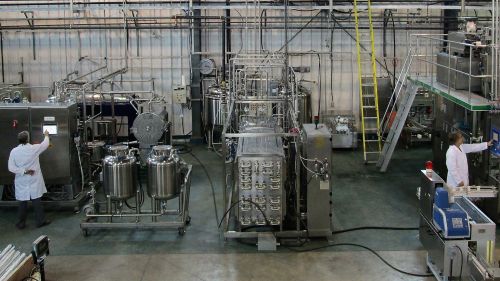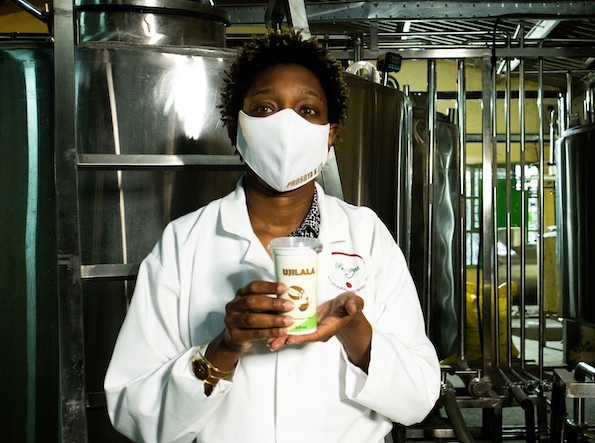COVID-19 Is Putting Africa's Food Processors at Risk

Across Africa, food processors serve a vital function in protecting food security and livelihoods. But the COVID-19 pandemic is creating new challenges that threaten the very survival of these companies.
Introduction
This is the first in a series of columns on global food security from the international development nonprofit TechnoServe. With the number of people facing life-threatening hunger in the world expected to double this year to 265 million, solutions addressing each link in the food system are essential. Drawing from its work across value chains with a range of public and private partners, TechnoServe will highlight the latest challenges, insights, and promising approaches in the current effort to prevent widespread food insecurity and build greater long-term resilience.

In Nairobi, Kenya, food processor Prosoya isn’t in business just to make money. It was launched with a social purpose in mind: creating safe and nutritious food for vulnerable communities. Through hard work, it grew into a successful enterprise, sourcing crops from 4,000 farmers and manufacturing nutritional foods like fortified porridges.
But then the COVID-19 pandemic struck. “As a company, we were not sure initially how the pandemic was going to affect our business. As days went by, we started experiencing some disruptions in the supply chain, especially the availability of raw materials coming from local areas, COMESA, and other regions,” said Kaburu Muguika, the firm’s managing director.
“Also due to restrictions and requirements put in place by the government, our products could not reach all the end users on time. All the big markets were closed to observe social distancing and restrictions on gatherings, and again, this affected our sales greatly. Some of our customers are schools and learning institutions who were also forced to close.”
When the full impact of the pandemic became clear, sales were down 70 percent.
Across Africa, firms like Prosoya serve a vital function in protecting food security and livelihoods. But the COVID-19 pandemic is creating new challenges that threaten the very survival of these companies. As TechnoServe has worked with food processing firms to understand and respond to these challenges, we’ve seen not only the difficulties that the sector faces, but also the opportunities to help it weather the pandemic and recover.
A vital sector for weathering the COVID-19 pandemic
If you imagine a chain connecting farmers to consumers, food processors often form the central link, serving as a dependable market for smallholder farmers’ crops and a purveyor of safe food for consumers. Those connections are more important than ever for promoting food security.
Due to the COVID-19 crisis, farmers are struggling to sell their harvests—and especially food crops. In August, TechnoServe interviewed 783 smallholder farmers and found 54 percent reported a loss of income in the last month, with 70 percent reporting lower crop prices than usual. Processors are vital market makers for millions of farmers; when these firms are thriving, they provide farmers the income they need to purchase essentials, like nutritious food.
But food processors are also a major producer of this nutritious food. As supply chains for fresh foods have been disrupted by transit delays and consumers have sought to avoid frequent visits to crowded markets and shops, demand in both rural and urban areas for safe, shelf-stable foods has only grown, putting even greater importance on the processing industry.
But while the sector is more important than ever, our surveys of food-processing firms across eight countries have shown that COVID-19 has caused significant disruptions and forced firms to adapt in new ways.
Finding new markets
In July, 68 percent of firms reported that their sales had dropped over the past three months. Processors that sell to institutional buyers--as Prosoya does--and the hospitality industry were most impacted, but transit restrictions and declines in the purchasing power of base-of-the-pyramid consumers have caused market, sales, and distribution challenges for three-quarters of all firms.
Faced with these obstacles, nearly half of the respondents reported looking for ways to reach new markets, up from 8 percent in April. For example, the Alliance for Inclusive and Nutritious Food Processing, a partnership between USAID, Partners in Food Solutions, and TechnoServe, has worked with Prosoya on the development, branding and marketing of a new fortified, ready-to-eat porridge for retail and has helped it develop a distribution strategy integrating small retail shops that reach base-of-the-pyramid consumers.
Prosoya is not alone in adapting the way it reaches clients, with nearly 30 percent of firms adopting new digital marketing and direct-to-consumer sales strategies.
Addressing supply and operations challenges
While market challenges are now the greatest issues facing the sector, surveys and interviews have revealed that food processors also face significant obstacles in their operations, as well. 63 percent of firms reported that they faced supply chain challenges, as COVID-19 restrictions have made it difficult to import packaging materials, fortificants, and other essential items, and to receive deliveries of some crops. As one Nigerian edible oil processor participating in the Strengthening African Processors of Fortified Foods program—a partnership between the Bill & Melinda Gates Foundation, PFS, and TechnoServe—reported, “[We have] an inability to access raw material due to lockdown and...run out of stock to sell to customers due to the inability to get raw material to produce.”
To address that challenge, our business advisors are working with firms to identify new suppliers (often local ones), engaging governments to allow vital shipments to get through, and supporting shifts to digital sourcing tools.
Firms have also been confronted with the question of how to keep staff safe while maintaining production levels, with just over half of surveyed firms reporting workforce challenges. But this number is down significantly from April, when nearly 70 percent of firms reported disruptions to their workforce, as companies have learned more about the virus and incorporated new protocols, such as adapted shift management and increased hygiene measures.
A call to action
Food processing firms have shown remarkable creativity and resiliency in the face of crisis, but they will need additional support as they move from survival to restructuring and optimization. Firms urgently need better access to finance--more than 40 percent of the firms we surveyed had already sought some form of financial assistance, but credit markets have been tight--to provide working capital and make necessary adjustments.
But it’s not just money. We must work with governments and other stakeholders to ensure that food and essential materials can be safely traded within and between countries, and we must facilitate access to the kind of technical assistance that Prosoya received, which helps businesses adapt. Food processors can benefit greatly from a bird's eye view of the market that helps them analyze the current situation and market changes, implement plans to weather the crisis, and pivot their business model to respond to the changing situation.
The work of food processing firms is more important than ever; with the right support, they will be able to continue their essential role within the food system.